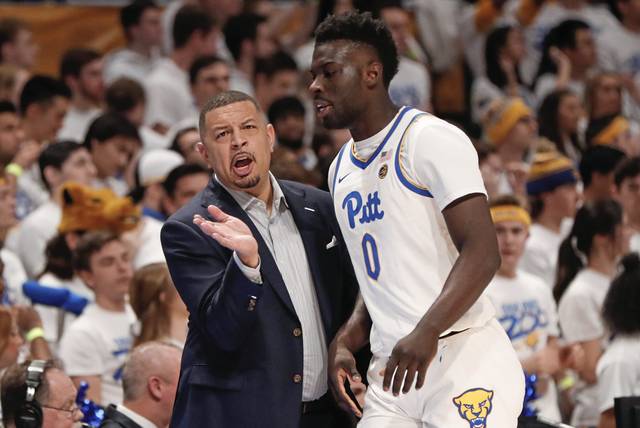https://triblive.com/sports/martin-luther-king-day-important-to-pitts-jeff-capel-and-his-family/
Martin Luther King Day important to Pitt’s Jeff Capel and his family

Pitt coach Jeff Capel likes talking to his players about the opportunities they have as student-athletes at a major university.
But he didn’t need a holiday Monday to underscore what the legacy of Dr. Martin Luther King Jr. means to him and his family.
Capel grew up listening to the wisdom of his paternal grandfather, Felton Capel Sr., a businessman and politician from Southern Pines, N.C., who was hand-picked by King to help desegregate southern states.
Capel called his grandfather “the happiest, friendliest … smartest man I ever met in my life.”
Felton Capel, who died in 2018 at the age of 91, organized marches and sit-ins, helped desegrate schools, golf courses and theatres and even was spat upon, according to stories Capel’s father, Jeff Capel Jr., told him.
“The thing that was fascinating to me as I got older and I started to understand things better and understand the world better,” Capel said, “the thing that just kind of blew me away is the fact that he was able to be that way in spite of the stuff that he saw and experienced first-hand.
“These are stories that I read about. These are things he actually went through and lived through and saw and experienced.”
Despite the turbulent times and the challenges he encountered, Felton Capel was everyone’s friend, no matter color or gender, his grandson said.
Capel had a busy Monday at the Petersen Events Center, preparing for Pitt’s game Wednesday against Boston College, but he was eager to share some of his favorite stories about his grandfather.
“He called everybody partner,” Capel said. “To us, he was just Pop.”
Felton Capel got his start as a salesman, a good one.
“He had to drop out of college (Hampton Institute in Virginia, now Hampton University),” Pitt’s coach said, “because his dad died and he went home to help take care of his family.”
So, he got a job selling cookware.
“He was the top seller,” Capel said. “At the end of the year, they would have a banquet to honor the top sellers. He would never go because people thought our last name was Ca- PEL. So, they thought he was French. He would never go because he didn’t want the people to know that he was black.
“Ten years later, he bought the company.”
He also developed a park in Pine Bluff, N.C., that became a meeting place for African-American families.
“In the states of North Carolina and South Carolina, for the longest time, it was the only place where black people could go to have family reunions,” Capel said. To this day, people approach Capel and tell him stories of his grandfather’s park.
Like Dr. King, Felton Capel knew what he was doing could help future generations. That’s why he was proud when his grandson went to Duke on a basketball scholarship.
He told the Oklahoman newspaper in 2008, “When I was 18, even if I had good enough grades, I wasn’t going to get into a school like Duke. Then, I got to watch my grandson, not only get in, but be recruited to come there when he was just a junior in high school.”
“I’m the III,” said Pitt’s coach, whose given name is Felton J. Capel III. “He’s senior. My dad’s junior.
“He wanted to go to Duke, but he couldn’t even apply because he was black. However many number of years later, his grandson, his namesake, graduated from Duke.”
Felton Capel stood up at a family reunion and told that story. That’s the one of which Jeff Capel is most proud.
When Capel speaks of his grandfather, it sparks memories of Martin Luther King.
The opportunities that have arisen for African-American athletes, largely because of King’s fight against racism more than 50 years ago, is something Capel won’t allow his players to take lightly.
“We talk about this all the time, the opportunities that they have now,” he said. “Our guys, this current generation, because of the work of the forefathers, because of the work of others. Some of those others could be family members of theirs, could be their grandparents, their great-grandparents or an uncle or aunt.
“We understand that none of us are where we are alone. We’ve all had help. That was one of Dr. King’s, to me, one of his great messages, that we need each other.”
Capel said many of King’s teachings offer valuable lessons more than five decades after his death.
“It’s amazing. It’s also sad, to a certain extent,” he said. “All these years later, here we are in 2020 and you go back and you listen to some of those speeches. You read some of his works. You read some of his books, and you look at today, and these things still apply.
“I often wonder how he would feel, if he were still alive, of where we are as a country. Because certainly there are some things that are way better, the fact that we actually have freedom. When I say we — black people, African-Americans — can do some of same things that everyone does.
“But if you look at a lot of the (negative) things, these things still resonate, and that’s, unfortunately, very sad. Everyone needs to have the same freedoms. Everyone needs to understand about love and about being together. Certainly in our country right now we need that. ”
Get the latest news about Pitt basketball and all things Panthers athletics.
Copyright ©2026— Trib Total Media, LLC (TribLIVE.com)
